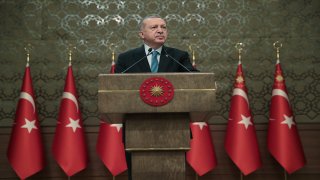The Age of Middle Powers Has Arrived. The expanding role of middle powers in the evolving multipolar world presents both challenges and opportunities for global players.

At the dawn of the new year, the geopolitical landscape underwent a transformative shift with the expansion of the BRICS to include Iran, Saudi Arabia, the United Arab Emirates, Egypt, and Ethiopia. This development has brought fresh attention to the reconfiguration of the global order, the ascent of multipolarity, and the increasingly influential role of middle powers. Despite their limited capabilities compared to great powers, middle powers strategically leverage the evolving global power distribution to secure opportunities for themselves.

Acknowledging that great powers rely on them for global influence, middle powers engage in power games, oscillating between collaboration and opposition to further their own interests. Generally, intensive high-stakes competition among great powers and sporadic collaboration present fertile grounds for middle powers to assert their influence. This prompts a critical examination of the evolving dynamics in international relations and the necessity for a nuanced approach in the face of an increasingly multipolar world.
In the aftermath of World War II, the globe was divided into two poles of power, compelling middle powers to align with either the United States or the Soviet Union. Genuine independent foreign policy for middle powers was nearly non-existent. The collapse of the Soviet Union presented a less binary choice: align with the U.S.-led world order or pursue an independent path. However, opting against the sole global superpower risked forgoing the security guarantees and economic benefits that accompanied alignment. Consequently, many middle powers aligned with the U.S.-led order, actively participating in international organizations.
The unipolar moment gradually waned as the relative global influence of the United States diminished. Factors such as the rise of China's economic power and its ability to attract allies, the 2008 global financial crisis, the substantial costs incurred during the Iraq and Afghanistan wars, and the overall empowerment of middle powers contributed to this paradigm shift. This diminishing influence posed challenges for the United States and its allies in advancing collective interests worldwide, creating a cadre of middle powers more inclined to take bold actions.
While the world still exhibits elements of bipolarity, with the United States maintaining unchallenged superpower status in certain aspects and the rise of China, it has begun to take a distinctive shape. The increasing relevance and confidence of middle powers signify a shift toward multipolarity. A rising China-led bloc provides middle powers with alternatives, reducing their dependence on the United States. In a multipolar world, middle powers gain even more options, independence, and, consequently, more leverage. This translates into increased assertiveness and a departure from unquestioning obedience to one side. The notion that a world with multiple global powers fosters bold and assertive actions is exemplified by several middle powers. Powerful middle powers in various regions are displaying heightened interest in regional hegemony.
Turkey's recent activity in the Middle East, the South Caucasus, Central Asia, and Africa, and its active role in Ukraine and the Palestinian-Israeli conflict; Brazil's aspirations to be the voice of Latin America and the Global South; and India's expanding global and regional ambitions exemplify this trend. Turkey's strategic U-turn, transitioning to a more independent and assertive actor in the Middle East, perfectly illustrates the impact of multiple poles of power on middle power behavior. Theoretically, the relative decline of hegemony has contributed to increased nationalist surges, regional crises, global weakening of institutions, and a pursuit of more independent foreign policies by middle powers.
Addressing the evolving world order requires the United States and its allies to acknowledge the changing dynamics realistically. Middle powers are gaining leverage in choosing their partners, potentially presenting new challenges for the United States. These powers are also more likely to become even more assertive in their demands and ambitions. The era where the United States could effortlessly secure compliance and support is fading, as evidenced by recent UN voting patterns. The United States needs a more nuanced strategy to navigate this shifting landscape.
Rather than being excessively selective in choosing regional partners, the focus should be identifying active regional powers willing to collaborate on specific issues. Viewing all regionally hegemonic ambitions as threats risks alienating middle powers and turning entire regions against the West. The key lies in fostering partnerships with at least one ambitious middle power in each region amenable to collaboration. While acknowledging the potential risks of increasing regional hegemony, the reality of a prolonged power transition demands a nuanced approach. Carefully cultivating friendships with regionally ambitious and assertive middle powers remains a preferable strategy to outright confrontation, considering the inevitability of clashing interests in this period of global instability.
The expanding role of middle powers in the evolving multipolar world presents challenges and opportunities for global players. As the dynamics continue to shift, adapting strategies to engage with middle powers becomes imperative. The world is in flux, and embracing a flexible and inclusive approach to international relations is essential to navigate this complex landscape.
- Questions and Answers
- Opinion
- Motivational and Inspiring Story
- Technology
- Live and Let live
- Focus
- Geopolitics
- Military-Arms/Equipment
- Sécurité
- Economy
- Beasts of Nations
- Machine Tools-The “Mother Industry”
- Art
- Causes
- Crafts
- Dance
- Drinks
- Film/Movie
- Fitness
- Food
- Jeux
- Gardening
- Health
- Domicile
- Literature
- Music
- Networking
- Autre
- Party
- Religion
- Shopping
- Sports
- Theater
- Health and Wellness
- News
- Culture

